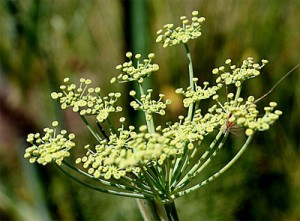FENNEL
Botanical Name: Foeniculum vulgare
Folk Names: Samar, Sheeh, Sweet Fennel
Fennel is a Perennial herb from the Apiaceae family. Native to the Mediterranean and Southern Europe, it grows to the height of 2-6 feet.
Fennel was hung above doorways and on rafters in order to ward off evil in the Middle Ages. The seeds were placed inside keyholes to prevent ghosts from entering the house. In 470 b.c. the Greeks defeated the Persians at Marathon. They fought on a field of fennel and this led to the belief that fennel inspired courage and strength. Greek and Roman soldiers chewed fennel seeds before entering battle.
Deities: Dionysus, Prometheus
Element: Fire (Courage, Exorcism, Health, Lust, Protection, Strength)
Gender: Masculine
Planet: Mercury (Divination, Mental Powers, Psychic Powers, Wisdom)
Powers: Healing, Protection, Purification
Medicinal uses: All parts of the Fennel plant are used. Fennel is known to relieve digestive problems, increases lactation, relax spasms and reduce inflammation with expectorant, carminative and aromatic properties. Sweet Fennel oil is used in aromatherapy (it contains anethole, fenchon, limonene and a-pinene, while the seeds contain various flavonoids and furanocoumarins ).
Magical Uses: Hang over doors and windows with St. John’s Wort to repel evil spirits. Grow around the house, scent soaps and perfumes to ward off negativity and evil.
Ritual Uses: Use in spells and sachets for protection, healing, and purification. The oil can be used to enhance personal courage and strength, as well as love.
Other Uses: Syrup from fennel juice was given for chronic coughs. It is known to drive away fleas, powdered fennel has been used in kennels and stables.
References:
- Gardenguides.com
- American Botanical Council
- Scott Cunningham: Cunningham’s Encyclopedia of magical herbs
Note: Consult with a Physician or certified herbologist if you are seeking medical remedies. The information is not intended as medical advice. PagansWorld.org is not liable for the misuse of the herb listed above.
Thanks for stopping by! Well wishes to you all and have a great day!
Lisa





